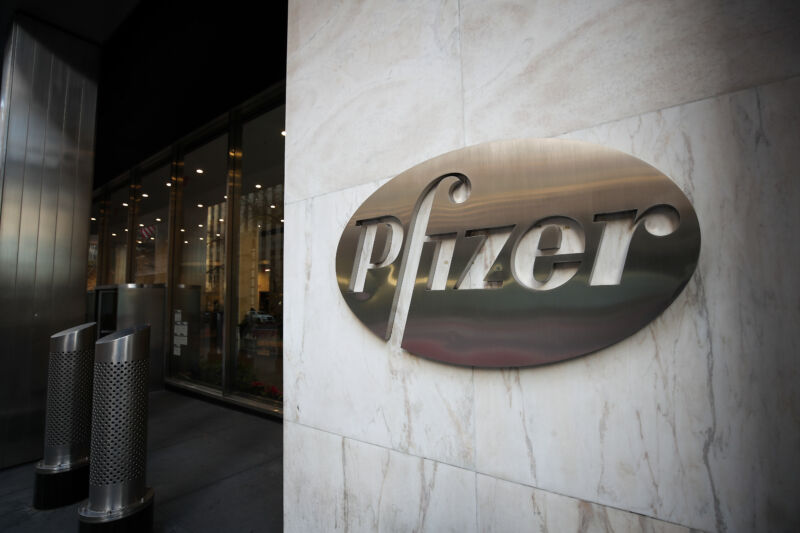
An antiviral pill developed by Pfizer reduced COVID-19 hospitalizations and deaths by about 89 percent in a trial involving 774 newly infected people at risk of developing severe disease. That's according to a press release posted Friday by the company; the full data has not yet been released, published, or peer-reviewed.
Still, Pfizer said the results looked promising enough that an independent data-monitoring committee recommended the trial end early. Pfizer said it now plans to submit its data as soon as possible to the Food and Drug Administration for an Emergency Use Authorization (EUA).
Pfizer's oral antiviral—PF-07321332—is the second drug candidate to generate buzz as an easy-to-use and highly effective COVID-19 treatment. Last month, Merck announced that its oral antiviral treatment, molnupiravir, cut the risk of hospitalization and death from COVID-19 by roughly 50 percent in newly infected, at-risk people. Merck has applied for an EUA, and FDA advisers will review the application on November 30.
Advantages
Though health experts are happy to have as many effective drugs as possible to fight the devastating pandemic, Pfizer has not-so-subtly noted the advantages PF-07321332 has over molnupiravir. Beyond the better efficacy (89 percent vs. 50 percent), Pfizer pointed out in its press release that PF-07321332 "originated in Pfizer’s laboratories." In fact, its development started with Pfizer's work to find a treatment for SARS-CoV-1 after the 2002 SARS outbreak. Highlighting this fact seems to be a shot at Merck's molnupiravir, which was born in an academic research lab at Emory University years ago. Merck only purchased rights to the drug in 2020 during late-stage development against COVID-19.
Pfizer also noted that PF-07321332 "did not demonstrate evidence of mutagenic DNA interactions," another apparent jab at molnupiravir. PF-07321332 is a protease-inhibiting drug; it works by hindering a specific enzyme, called a protease, found in SARS-CoV-2 and other coronaviruses. The protease plays a critical role for the virus by snipping apart strings of proteins into smaller units that are functional—and vital to the virus's ability to make infectious copies of itself. By inhibiting the protease, PF-07321332 prevents SARS-CoV-2 from replicating.
By contrast, molnupiravir thwarts SARS-CoV-2 by posing as a building block for the virus's genetic code, which is in the form of RNA. When the virus's RNA-dependent RNA polymerase—an enzyme that makes copies of SARS-CoV-2's RNA code—incorporates the drug into new RNA strands, those strands are doomed, and the virus is unable to make viable copies of itself. Though early animal and human trial data suggest that molnupiravir is safe, there exists the theoretical possibility that the drug could also damage the human genetic code. For this reason, it's unlikely that the drug will be used during pregnancy.
Limited data
For now, there's only a small amount of data available to fully evaluate PF-07321332. According to Pfizer's press release, 774 people newly diagnosed with SARS-CoV-2 and at high risk of developing severe COVID-19 were enrolled in a trial. Of those, 389 received PF-07321332 and an HIV antiviral drug called ritonavir within three days of developing symptoms, and 385 received a placebo and standard care. (Ritonavir helps slow the metabolism and breakdown of PF-07321332 in the body so it can be active for longer, Pfizer said.) After 28 days, only three PF-07321332-treated patients were hospitalized, and zero died. Meanwhile, 27 participants in the placebo group were hospitalized, and seven died. That works out to an 89 percent reduction in the risk of hospitalization and death.
Pfizer also looked at the drug's effects in people treated within five days of COVID-19 symptom onset, rather than three. In that trial of 1,219 people, 607 received PF-07321332 and ritonavir within five days. Only six treated people were hospitalized, and none died. Among the 612 people in the placebo groups, 41 were hospitalized, and 10 died. That trial indicates about an 85 percent reduction in risk of hospitalization and death.
As for safety, Pfizer said that mild effects were reported about equally between the treated and placebo groups (19 percent vs. 21 percent). Also, more people receiving a placebo reported serious side effects (1.7 percent vs. 6.6 percent), and more dropped out of the trial (2.1 percent vs. 4.1 percent) than people treated with PF-07321332.
If PF-07321332 is granted authorization, Pfizer says it will offer the drug with tiered pricing based on countries' income levels. But experts are already skeptical of equitable distribution of the drug based on the significant inequity in the distribution of Pfizer's COVID-19 vaccine.
Article From & Read More ( Pfizer says its antiviral pill can cut 89% of COVID hospitalizations and deaths - Ars Technica )https://ift.tt/3mNu9Eo
Business
Bagikan Berita Ini














0 Response to "Pfizer says its antiviral pill can cut 89% of COVID hospitalizations and deaths - Ars Technica"
Post a Comment